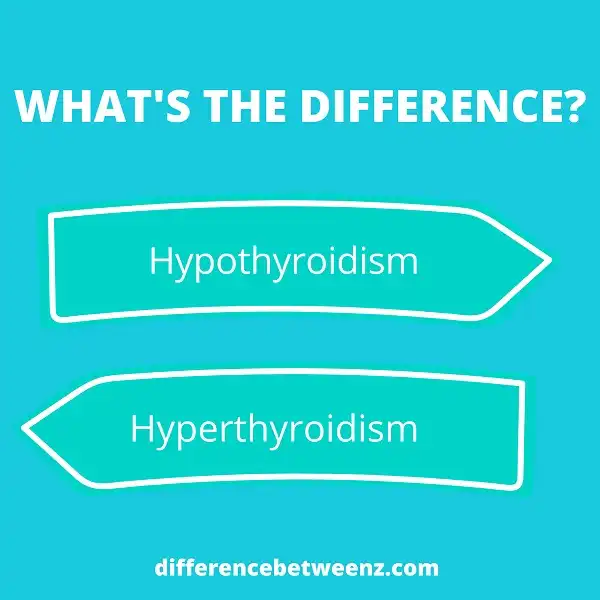Hypothyroidism vs Hyperthyroidism
Difference between hypothyroidism and hyperthyroidism:- The thyroid is an endocrine gland located in the neck of vertebrate animals, including humans. This gland is responsible for storing, producing and secreting hormones into the bloodstream and regulating many of the functions of the body; Such as heart rate, pressure, temperature, metabolism, growth and development of the brain and nervous system.
Taking into account all the functions related to this gland, it is not difficult to understand why its importance and why problems with it are usually very serious and should be taken with great care.
Difference between Hypothyroidism and Hyperthyroidism
Surely you have heard about hypothyroidism and hyperthyroidism. These are two of the major problems that can affect the thyroid. If you want more information about it or do not know the difference between hypothyroidism and hyperthyroidism, continue reading.
Hyperthyroidism
Also known as overactive thyroid, it occurs when the thyroid gland overproduces thyroid hormones, so that it accelerates the body’s natural functions.
The most common cause of this problem is usually Graves’ disease, an autoimmune disease that is also known as Diffuse Toxic Goiter, but in addition there are other possible causes, such as: thyroiditis, iodine deficiency, certain medications and nodules Thyroid.
Among the most common symptoms that can be observed in people affected by hyperthyroidism are: loss of weight and increased appetite, tachycardia, warm and moist skin, thin and soft hair and heat intolerance.
Hyperthyroidism is less common than hypothyroidism. Only 1% of Americans suffer from this condition. It is more common in women, especially after pregnancy.
Hypothyroidism
On the other hand, as its name implies, hypothyroidism is the opposite of hyperthyroidism. In this case the problem occurs because the thyroid does not secrete enough thyroid hormones, which leads to a decrease or slow down of natural functions.
The most common cause of hypothyroidism is usually Hashimoto’s disease, also known as Chronic Lymphocytic Thyroiditis. Other causes may be: thyroiditis, excess iodine, some medications, genetic problems and treatments to combat hyperthyroidism.
Hypothyroidism is much more common than hyperthyroidism. It affects about 5% of the population in the United States. Also in this case it is the women who are most likely to have this condition, especially after pregnancy.
Some of the most common symptoms are: weight gain and loss of appetite, bradycardia, and thick and dry skin, brittle hair and cold intolerance.
Key Differences between Hyperthyroidism and Hypothyroidism
- Hyperthyroidism consists of an overproduction of thyroid
- hormones, whereas hypothyroidism occurs when the thyroid does
- not produce enough hormones.
- Hypothyroidism is more common than hyperthyroidism.
- When you have hyperthyroidism you lose weight, when you have
- hypothyroidism you gain weight.


